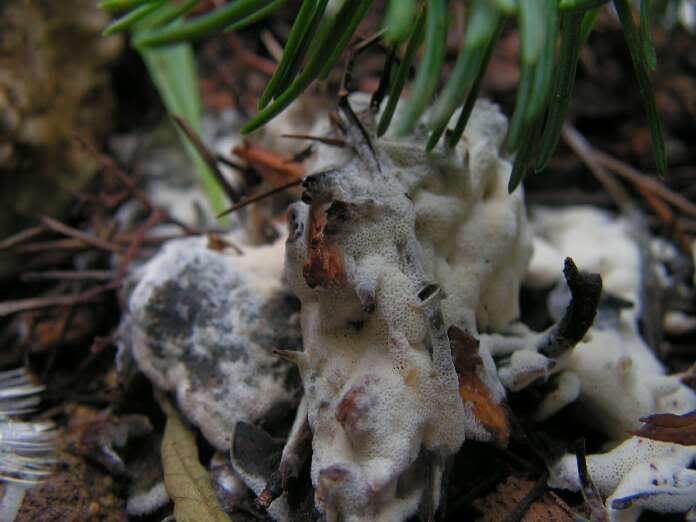
Mushrooms Growing In My Compost Bin? Good or Bad? Should I Worry? Have you ever wondered what that white substance on your compost pile is? I guess you might have thought what a gross aspect your compost pile has. Whereas actually, this is quite normal. They're mushrooms. Yes, a mushroom is growing in your compost bin!
Now, why are mushrooms mentioned among typical compost problems? Well, though the production of mushrooms is typical in some decomposing processes, sometimes they might indicate something else. For more on this, don't miss Composting Problems: Types and How to Deal With Them.
Read through to understand why you have mushrooms, which ones can be easily found, and their function (or threats!).
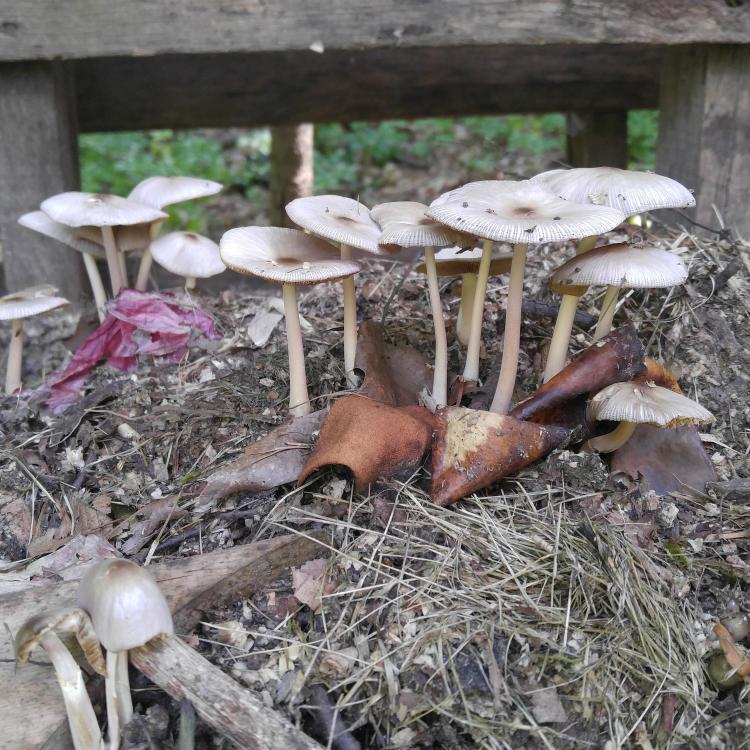
Fungi or mushrooms? Are they the same? Actually, all mushrooms are fungi though not all fungi are mushrooms. Good point. Some fungi do produce these caps called mushrooms which are, basically, like flowers growing from a plant. It’s important that you know that many mushroom-producing species of fungi are important decomposers, so that’s great news for your compost pile!
If you have mold on your compost, organic materials are breaking down. The presence of mold on your compost is totally a good thing, so don’t worry. They are transforming your organic waste, basically, to turn it into rich soil.
Let’s see the typical “visitors” you can find in your compost pile:
What's mold? What should I do if I have mold in my compost? Should I worry about mold on my compost? The presence of mold means mushrooms growing in my compost? Don’t worry; having mold in your compost is a good sign most of the time. Molds are a type of fungus it might appear on your heap, meaning microbes are doing their job. If you see mold in your compost pile, it means full decomposition, and it’s not dangerous as long as you mix it properly.
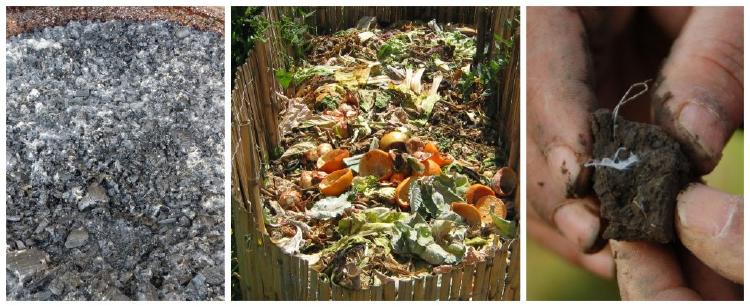
Here is what you need to know: How to make a Compost Pile? All you need to know about it
Just think about it. Anything that can decompose will ultimately have mold on it. Bread, fruits, veggies, or food left in the fridge can probably develop this sickening mold. The occurrence of mold is more typically present in cold compost rather than hot because mold doesn’t feel ok in hot temperatures, and it doesn't grow.
White or green mold is the most common in a compost heap. The white one is rather harmless but can indicate that something is wrong in your compost pile. Be careful if it smells bad because this means anaerobic bacteria are in your pile, and we don’t want this. You need to encourage aerobic bacteria instead.
Molds look like cotton. Their different colors depending on the food they’re “eating” and on climate:
Green Mold: this is the most common you may find in compost. It typically appears in compost piles which have a lot of material.
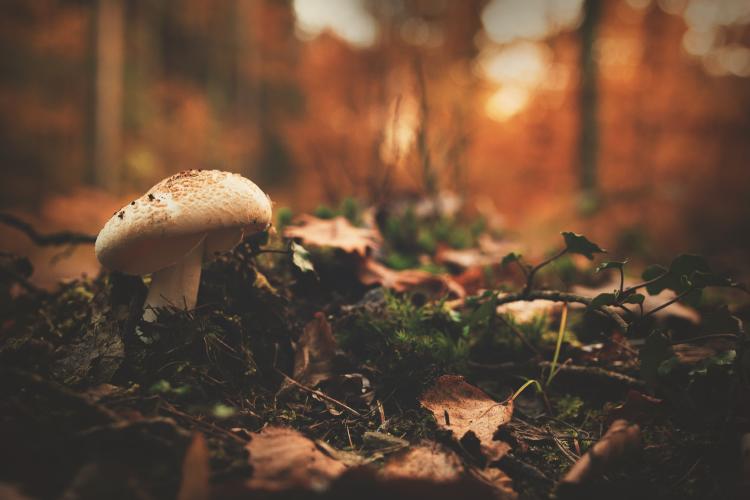
Well, though it might sound like a tough word to learn, it’s important that you know what it means. Actinomycetes are fungus-like bacteria playing a big role in the decomposition process in your compost pile. Their presence is a sign of an imbalance of green and brown materials though in manure compost, for example, it might be a good thing (successful decomposition).
If you want to recognize this type of bacteria in your pile, you’ll see a grayish substance that looks like a cobweb, and it has an earthy smell typical of good compost. So, it’s key that you maintain a good environment for this bacteria to grow. Moist the soil (not too much!), reduce pH levels, and add organic material because it’s actinomycetes’ dinner! Also, keep your pile aerated, and you’ll get a perfect dark earthy compost.
As said before, having mushrooms growing in your compost is good news. What’s more, you can add mushrooms to your compost pile. The use of mushroom compost is highly beneficial. It makes your soil richer, and it’s a perfect nutrient supplier. Plus, it improves the absorption of water in the soil. And the most important benefit, mushrooms are the ultimate composter, breaking down organic material and thus accelerating the decomposition process.
Check this out: How to Choose the Best Indoor Compost Bins? The Ultimate Guide
Now, there’s a lot you can learn about growing your own mushrooms in your compost pile. No more mushrooms from the grocery. Take advantage of your pile and try this out!
These are called secondary decomposers mushrooms because they appear after the fungi at the top of the rot chain have already done their jobs.
In case you decide to have mushrooms growing in your compost, keep these tips in mind to be successful:
You may be interested: All the Tools Needed for Composting and Build your Worm Farm.
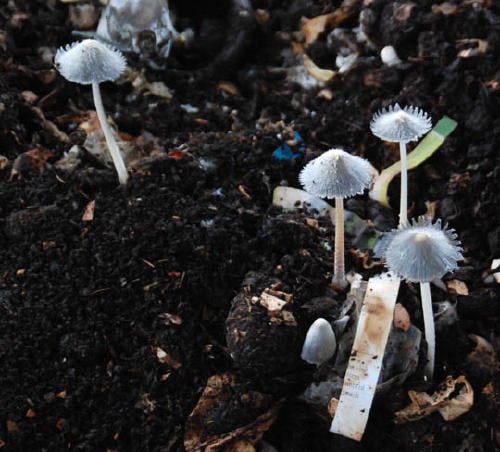
Among the most typical types of mushrooms to grow on your compost, you have:
Watch out in case you have this type of fungus:
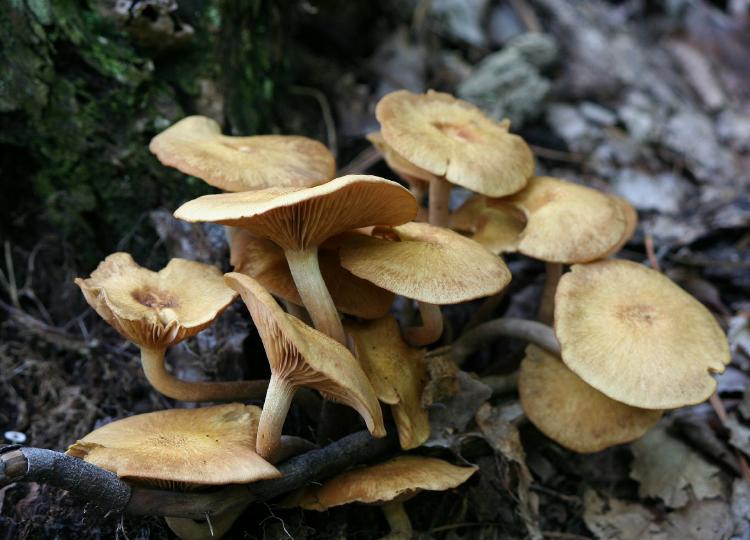
Remember that toadstools and fungi, in general, thrive in humid atmospheres. They grow from fine threads of fungus called mycelium, which is present in any compost pile. Also, they love warm and wet environments to produce mushrooms.
If you don’t want mushrooms growing in your compost pile, make sure you have a good ratio of greens and nitrogen sources in your compost pile. Be sure you turn your pile regularly to avoid their presence. Also, keep a good balance between cellulose and nitrogen (food scraps, for example) and frequently aerate with a pitchfork or tumbler.
Having mushrooms growing in your compost can not only be a good thing as your pile is working well, but it’s also a great opportunity to start a new challenge: growing your own mushrooms!
Whether you have mold or any type of fungi on your compost heap, it means basically that microorganisms are doing their job. You’re adding the precise amount of water it needs, and the mixing is appropriate. There’s a variety of mushroom species you can grow if you follow the right steps and keep an eye on the pile frequently. It may take extra time, but it’s worth it.
Now, fungi and bacteria are among the most frequent compost problems people face when they start composting. If these mushrooms growing in your compost or mold on top of the pile produce a bad smell, you can always change this by keeping a balance of the ingredients you’re adding.Learn more about this topic on Smelly Compost? How to Control Bad Smell on Your Compost
Remember that though mold is frequent in any decomposition process, you can get rid of it by changing ingredients, techniques, and the quantity of water you add. If your compost is too wet, mushrooms and mold will flourish. Learn the reasons for this in Compost Too Wet? Reasons Why and Tips to Fix a Soggy Compost
The material you add can always be the perfect dinner for mushrooms, so keep an eye on this and make a good selection of ingredients to get that earthy dark fresh soil out of your compost pile.